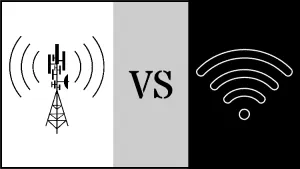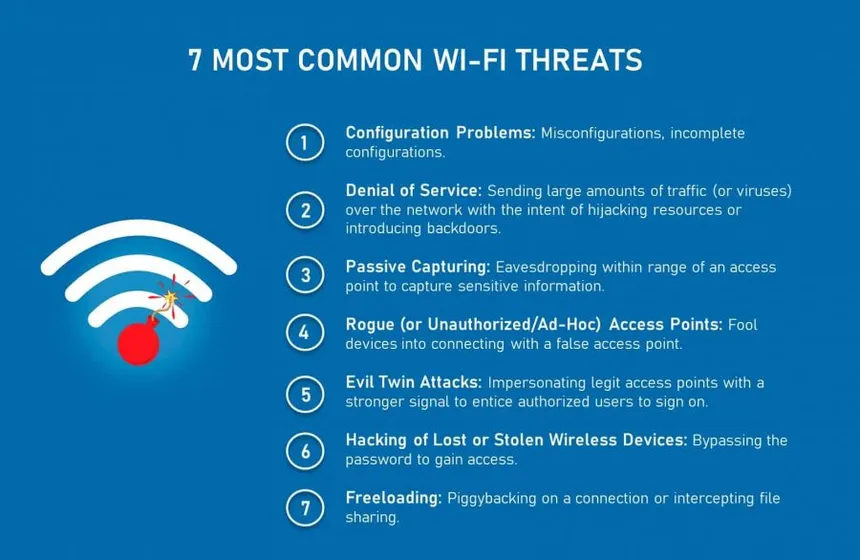Wi-Fi or Mobile Data: Which is Safer?
 Ayan
Ayan
In today's connected world, staying online is essential. Whether we're browsing social media, working remotely, or streaming entertainment, we rely heavily on internet access. Two primary options dominate this space: Wi-Fi and mobile data. While both provide seamless access to the digital world, the question of security often arises: Is Wi-Fi or mobile data safer?
Understanding Wi-Fi and Mobile Data
Before diving into which is safer, it’s important to understand the basic differences:
Wi-Fi is a wireless network that connects your devices (smartphones, laptops, etc.) to the internet via a local router. Wi-Fi networks can be public or private, and their security often depends on the encryption used and who manages the network.
Mobile Data (3G, 4G, 5G) connects your device to the internet through cellular towers. It’s a service provided by telecom companies, offering access through your mobile phone plan.
Security Concerns with Wi-Fi
Wi-Fi, particularly public Wi-Fi networks (like those in cafes, airports, and libraries), comes with several vulnerabilities:
Open Networks and Eavesdropping: Public Wi-Fi networks are often unsecured, meaning anyone within range can connect. This creates an opportunity for malicious actors to eavesdrop on your internet activity, intercepting sensitive data like passwords, financial details, or personal messages.
Man-in-the-Middle Attacks: On a poorly secured Wi-Fi network, hackers can position themselves between you and the internet. This type of attack allows them to capture and even alter your data without your knowledge.
Fake Networks: Hackers can set up fake Wi-Fi networks with names similar to trusted public networks. Once connected, they can monitor all your online activity.
Weak Encryption: Some Wi-Fi networks may use outdated or weak encryption protocols (like WEP) that are easy to crack, leaving your data exposed.

Mobile Data: A Safer Alternative?
Mobile data tends to be a safer option for a few reasons:
Encrypted Connections: Mobile networks use stronger encryption methods than most public Wi-Fi networks. 4G and 5G networks, in particular, employ advanced encryption techniques that make it significantly harder for attackers to intercept data.
Fewer Opportunities for Attackers: Mobile networks are more difficult for hackers to breach compared to public Wi-Fi. Attackers would need sophisticated equipment and deeper technical knowledge to target mobile data effectively.
No Open Networks: Unlike public Wi-Fi, mobile networks are typically accessible only by devices with SIM cards and data plans, which adds an additional layer of protection.
Carrier-Level Security: Mobile service providers often implement robust security protocols, monitoring for suspicious activity and responding to potential threats quickly.

When Wi-Fi Is Safe 🤔
While mobile data is generally safer, Wi-Fi isn’t inherently insecure, especially when connected to a private network or a secure public hotspot. Here are ways to use Wi-Fi safely:
Use WPA3 Encryption: Ensure your home Wi-Fi is set to WPA3 encryption, the latest and most secure Wi-Fi encryption protocol.
Use a Virtual Private Network (VPN): VPNs encrypt your internet traffic, making it harder for hackers to intercept data, even on public Wi-Fi. This is a great tool to secure your browsing activity.
Secure Public Wi-Fi: If you must use public Wi-Fi, stick to HTTPS websites (those that show a lock icon in the address bar) to ensure encrypted communication. Also, avoid logging into sensitive accounts like banking apps on unsecured networks.
Keep Devices Updated: Ensure your smartphone, tablet, or laptop is regularly updated with the latest security patches. This reduces the risk of vulnerabilities being exploited.
Balancing Convenience and Security
While mobile data is generally safer than public Wi-Fi, it can be more expensive and may not always be available in certain areas. Wi-Fi, on the other hand, offers faster speeds, greater data allowances, and is often free to use in public spaces. To balance convenience with security, follow these guidelines:
Use mobile data when handling sensitive tasks, like online banking or accessing private accounts.
Stick to trusted, secure Wi-Fi networks when available and use VPNs for added security.
Conclusion: Which Is Safer?
In terms of raw security, mobile data is typically the safer option due to its stronger encryption and fewer opportunities for hackers to intercept data. However, with proper precautions—such as using a VPN, avoiding suspicious networks, and enabling strong encryption—Wi-Fi can be used safely, too.
Ultimately, the decision between Wi-Fi and mobile data comes down to convenience and the level of risk you're willing to take. For the highest level of security, especially in public spaces, mobile data remains the better choice. But with the right security measures, Wi-Fi can still be a reliable and secure option for everyday use.
Subscribe to my newsletter
Read articles from Ayan directly inside your inbox. Subscribe to the newsletter, and don't miss out.
Written by

Ayan
Ayan
"I post blogs here in a simple way, so that a 5-year-old can read and understand them."